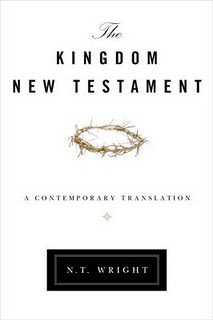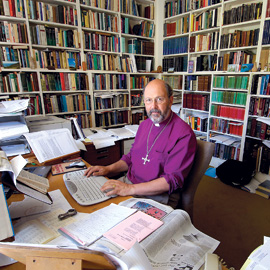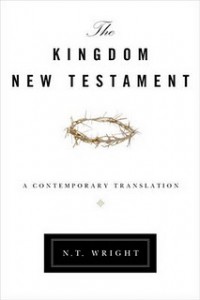 I recently read NT Wright’s The Kingdom New Testament,
I recently read NT Wright’s The Kingdom New Testament, which is a contemporary translation of the New Testament.
I think this is the first book by NT Wright that I did not like.
Some of the sections are great, but for the most part, his contemporary translation of the New Testament suffered from the same two problems that most other contemporary translations suffer from.
Contemporary Translations are So… Contemporary
The first problem with contemporary translations is that they are contemporary.
What I mean is this: Since culture and language changes so rapidly, what is “contemporary” now is no longer “contemporary” a few years from now. Contemporary translations of the Scriptures have a short shelf-life. Some contemporary translations from the 1960s, 1970s, and 1980s sound almost ridiculous today.
As I read NT Wright’s contemporary translation, I cringed at some of his word choices, as some of his phrases are already out of date. For example, in Matthew 23 when Jesus pronounces woes upon the Pharisees, NT Wright uses the phrase, “Woe betide you.” Maybe this is a British phrase, but I cannot recall hearing anyone ever use it. I looked it up online, and it was very popular in the 14th century, and was still in use by some in Great Britain up until about 20 years ago, but almost nobody uses it today. So NT Wright’s contemporary translation is already out of date in this instance, and there were numerous places this happened. One more example is in Matthew 2:8, where Herod says to the Magi: “Off you go.” I’m sorry, but no king then or now would speak with such informality.
When a contemporary translation fails at being contemporary, it ends up sounding silly. It is almost better to have a woodenly literal translation that sounds archaic, but is at least consistently archaic.
That is the first problem with contemporary translations (Including this one by Wright. However, I really do like the New Living Translation). What is the second problem?
Contemporary Translations are Culturally Bound
The second main problem with contemporary translations is that they are often culturally bound to the person (or persons) who made them. They often end up reflecting the culture of the translator more than that of the original text. I still remember reading Eugene Peterson’s The Message, and thinking that the Jesus in this translation sounded distinctly like someone who was stuck in the 1960s.
As I was reading NT Wright’s The Kingdom New Testament, I had a similar impression, though not of someone who lived in the 1960’s, but of someone who was trying to write a novel, and was failing miserably. NT Wright is a great scholar, theologian, and writer, but this translation made me think that he is a bad story teller. (That made me feel better, actually, because I am a horrible story teller.) There was too much repetition of words and phrases to make the Gospels truly readable.
This isn’t NT Wright’s fault. Not even the greatest novelist in the world could transform the New Testament into a well-written novel unless they took huge liberties with the text. But if they did this, the result would not be a translation at all.
For example, Greek and Hebrew repeatedly uses the word “said” in dialogue. Jesus said, “…” The apostles said, “…” Jesus said, “…” The apostles said, “…” This is really bad writing in English, and NT Wright tries to mix these up a bit for variety, but there is only so much you can do with long conversations (cf. John 21).
The problem with turning the New Testament into a contemporary translation is that none of it is contemporary. It was written in a form and a genre that no longer exists today, and so to make it fit literary forms of today is impossible.
A close example would be like trying to rewrite Shakespeare into modern language. Though it could be done, who would want to read it? The simple act of translation destroys the beauty of the narrative.
The same thing happens to Scripture when we try to put it in a contemporary translation. It needs to be archaic and “other worldly” for the same reason that Shakespeare needs to be archaic and “other worldly.” What reason is that? They ARE archaic and other worldly! They were written in a different time, place, and culture, and the text should reflect that. At numerous times, NT Wright tried to make the quotations from the Old Testament rhyme. He did this, of course, because the quotations are from Hebrew poetry (which didn’t rhyme), but today we expect poems to rhyme. But more often than not, his rhymes end up sounding like Nursery Rhymes, and they lose their force. Here are two examples from Matthew 21:
My house will be called a house of prayer–
But you have made it a brigand’s lair.You called forth praise to rise to you
From newborn babes and infants too!
Once again, I’m sorry, but NO! Thankfully, Wright did not do this with all the quotations from the Hebrew Scriptures.
Why Contemporary Translations are Helpful
Translations of the Scriptures are necessary since most people are not able to read Scripture in the original languages of Hebrew and Greek. But no translation is fully able to duplicate the structure and flow and imagery of the original, and each translation provides a slightly different perspective on the text. A Bible translation is, in a sense, the most basic type of Bible Commentary that exists. The word choices of the translator reveal what the translator thinks the text means.
 And here is where we get to the strength of NT Wright’s translation, and why I will probably be referring to it frequently in my own study, despite its idiosyncrasies.
And here is where we get to the strength of NT Wright’s translation, and why I will probably be referring to it frequently in my own study, despite its idiosyncrasies.
NT Wright is a world-class New Testament scholar and historian. On numerous occasions, his translation helps show the reader not just what the literal translation of the word is, but what it actually meant to the original readers. Or at least, what NT Wright thinks the text actually meant to the original readers. The translation does, after all, reveal Wright’s particular perspective on Jesus and Paul in numerous occasions.
In Romans, for example, where we usually read about justification and righteousness, Wright uses the phrases “covenant justice” and “being in the right.” In these cases, whether or not one agrees or disagrees with NT Wright on his perspective on Paul, I don’t think these translations are any more helpful for contemporary readers than were the terms “justification” and “righteousness.” Does anybody who has not read NT Wright’s perspective on Paul know what he means by “covenant justice” and “being in the right”? I doubt it. I’ve read some of his books on these subjects, and I’m still not sure what he means!
Nevertheless, reading one set of words where you expect a different set does make one stop and think about the text, and that is the strength of every new translation, NT Wright’s included. We get so comfortable with a particular view of a text, reading the text from a different perspective jars us into giving the text another look. For this reason, and this reason alone, I am glad to have a copy of NT Wright’s The Kingdom New Testament and will refer to it frequently in my own study of the New Testament.




I get the gist of what you are saying about translations especially the contemporary types which to us more seasoned Christians goes against the grain. I remember before I was a Christian I read the King James Bible, then when I became a Christian I purchased a Good News, after a few years I got a NIV now I’m using a New Living translation which includes notes of explanation to the passages. I am thinking about purchasing a Bible in chronological order. Why have i bought all these Bibles, because I yearn to understand more of Him, and I feel that to look at something form a different angle or perspective gives us a greater insight and also reveals things we had completely missed. I have a word game called BOGGLE which has a letter tray holding 16 cubes with a various letters on each face. You have a minute to see how many words you can see. It’s amazing how many words you each miss out on which are obvious when you are told, the reason for that is your seeing letters upside down, sideways etc. I feel translations are a bit like the Boggle game and can be just as exciting when you have a eureka experience.
I’m grateful to those who spend a lot of time trying to make the scriptures more understandable, so even if their not perfect it does not matter as long as it speaks to the person who journeying.
May the 9 lessons and carols, the Christingle service and the Christmas songs bring refreshment and a new sense of urgency as we think that we are another year closer to his coming again, to sweep us up with His Angels. Love Clive
Clive,
I am with you. I love the New Living Translation, but I also value the others. As I am reminding myself more and more these days, translation is explanation. Various translations help us understand how the theology of the person who did the translating, and therefore, helps give us a different perspective on Scripture.
So as you say, it is always helpful to consult a variety of translations. Each one provides a slightly different perspective on Scripture.
I haven’t read the particular translation in question, but this line in the post really resonated with me:
“We get so comfortable with a particular view of a text, reading the text from a different perspective jars us into giving the text another look.”
I have really experienced this effect with a good interlinear Greek/English bible. The differing word order, non-translated words, English words added to assist the translation, etc. really help with getting a handle on the Greek text.
It’s also a great way for those wanting to learn Greek to begin to get their feet wet with the language.
Another thing that has been really helpful to me is reading commentaries from the men of yesteryear. They provide great insight into the historical and cultural realities of the people and times where God delivered His Word.
If anyone is interested in starters, use the advanced search in google books and search on free texts only, and look for Godet, Lightfoot, Hort, or Neander. There are plenty of others but those are a great start.
I especially enjoy Godet’s and Neander’s works.
Have a good one,
/Scott
Great suggestions, Scott.
You are right that pretty much any other translation will do to get the different viewpoint. I like the idea of a Greek/English Bible. Then, of course, there is always something like the Parallel New Testament.
Hey Jeremy, I hadn’t seen that particular parallel Bible before… I think you just added something to my Christmas wish list!
It’s a good one. I have it and use it regularly. It is only the New Testament though…
My fav “contemporary” translation is still the Living Bible.
And, yes, perhaps Wright was thinking of a British audience to whom he was hoping, as they read it, something spiritual would betide them.